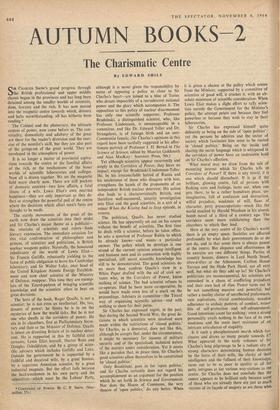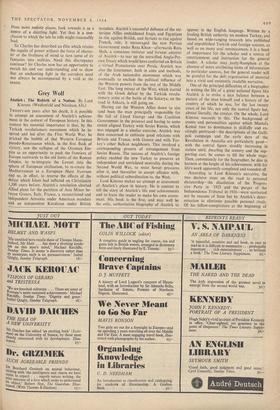AUTUMN BOOKS
The Charismatic Centre
By EDWARD SH1LS
C IR CHARLES SNOW'S grand progress through
the British professional and upper middle classes began in the provinces and has long been detained among the smaller worlds of scientists, dons, lawyers and the rich. It has now moved into the magnetic centre towards which, detours and halts notwithstanding, all has hitherto been tending.* The Cabinet and the plutocracy, the ultimate centres of power, now come before us. The con- viviality, domesticity and adultery of the great are there for the reader's diversion and the exer- cise of the novelist's skill, but they are also part of the goings-on of the great world. They are enveloped in the atmosphere of power.
It is no longer a matter of provincial aspira- tions towards the centre or the familial affairs of the rich, or the mechanisms of the lesser worlds of scientific laboratories and colleges. Now all is drawn together. We see the magnetic field more clearly now. There are still pockets of domestic concern—two love affairs, a fatal illness of a wife, Lewis Eliot's own married happiness—they are only important as they de- flect or strengthen the powerful pull of the centre where the decisions which affect men's fates are thought to be made.
The stately movements of the great of the earth now draw the scientists into their midst and Sir Charles's major theme as a publicist— the relations of scientists and rulers—finds literary expression. The immediate occasion for this vital confrontation of philosophers and princes, of scientists and politicians, is British nuclear weapons policy. Naturally, the honoured inhabitants of the world of Lewis Eliot-- Sir Francis Getliffe, reluctantly yielding to the force of public obligation to leave his Cambridge laboratory, and Sir Walter Luke, once head of the United Kingdom Atomic Energy Establish- ment and now chief scientist of the Ministry of Defence, reappear. This time they are exemp- lars of the Tizard-pattern of bringing scientific knowledge and the scientists' ethos to bear on great decisions.
The hero of the book, Roger Quaife, is not a scientist; he is not even an intellectual. He, too, dreams of power; he thinks he is in on the mysteries of how the world ticks. But he is not one who dwells in the corridors of power. He sits in its chambers, first as Parliamentary Secre- tary and then as the Minister of Defence. Quaife is intent on divesting Britain of its nuclear deter- rent. He is supported in this by faithful civil servants, Lewis Eliot himself, Hector Rose and Douglas Osbaldiston, and by a group of scien- tific advisers which includes Getliffe and Luke. Outside the government he is supported by a faithful and deceived wife, by a great hostess, by a sagacious American scientist, by a great industrial magnate. But the effort fails because the backwoodsmen in his own party and the opposition—which must be the Labour Party,
* CORRIDORS OF POWER. By C. P. Snow. (Mac- millan, 25s.) although it is never given the responsibility by name of opposing a policy so close to Sir Charles's heart—are joined to a bloc of Tories who dream impossibly of a recrudescent national power and the glory which accompanies it. The opposition to this policy of nuclear disarmament has only one scientific supporter, Professor Brodzinski, a distinguished scientist, who, like Professor Lindemann, is unmanageable in a committee, and like Dr. Edward Teller and Dr. Strangelove, is of foreign birth and an anti- Communist fanatic. (Sir Charles's opinions in this regard have been tactfully suggested in his affec- tionate portrait of Professor J. D. Bernal in The Science of Science, edited by Maurice Goldsmith and Alan MacKay: Souvenir Press, 30s.) Yet although scientists appear recurrently and amply in the Corridors of Power, they leave no impact, except for Brodzinski-Lindemann-Teller. He, by his irreconcilable hatred of Russia and his intolerance of those who disagree with him, strengthens the hands of the proponents of an independent British nuclear deterrent. His action also leads to a characteristically British, and therefore well-mannered, security investigation into Eliot and the good scientists, in a sort of a minor When the Kissing had to Stop episode, in reverse.
The politician, Quaife, has never studied science. He has apparently set out on his course without the benefit of scientists. The first time he deals with a scientist, before he takes office, he asks a question of Professor Rubin to which he already knows—and wants—a particular answer. The policy which he develops is one strand of the current opinion among intelligent and humane men and its connection with highly specialised, still secret scientific knowledge has still to be demonstrated. The good scientists do no more than confirm Quaife's view in a White Paper drafted with the aid of civil ser- vants who, in the Corridors of Power, know nothing of' science. The bad scientist refuses to co-operate. Had he been more co-operative, he would have made even less of a mark on the proceedings. Advisers in committee—the Tizard way of organising scientific advice—end with nothing to show for their pains.
Sir Charles has expressed regret, in the past, that during the Second World War, the great de- cisions in which scientists were involved were made within the restrictions of 'closed politics.' Sir Charles, as a democrat, does not like this, although he accepts that, under the circumstances, it might be necessary for reasons of military security and of the specialised, technical nature of the matters under consideration. Yet it seems like a paradox that, in peace time, Sir Charles's good scientists allow themselves to be constrained by 'closed politics.'
Only Brodzinski goes in for `open politics,' and Sir Charles certainly does not regard his accomplishment as an argument for the position which he set forth in Science and Government. Nor does the House of Commons, the very theatre of `open politics,' do any better. When it is given a chance at the policy which comes from the Minister, supported by a committee of scientists of good will, it crushes it, with an ab- solute minimum of scientific consideration. When Lewis Eliot makes a slight effort to rally scien- tists outside the Government for the Minister's policy, the attempt peters out because they feel powerless or because they wish to stay in their laboratories,
Sir Charles has expressed himself quite definitely as being on the side of 'open politics':' yet the persons he admires and the sector of society which fascinates him seem to be rooted in 'closed politics.' Being on the inside and sharing the secret language which is whispered in the corridors of power have an undeniable hold on Sir Charles's affection.
What moral may we draw from the tale of mounting interest which Sir Charles tells in Corridors of Power? If there is any moral, it is one which should disenchant. It is as if the brilliant, glowing centre, full of persons with flashing eyes and feelings, turns out, when one gets there, to be a rather humdrum place, tin- imaginative, full of confusion and distraction, wilful prejudice, weakness of will, flaws of character, petty preoccupations—much like the world mocked by Harold Nicolson in his atomic bomb novel of a third of a century ago. The corridors seem more exhilarating than the chambers to which they lead.
Here at the very centre of Sir Charles's world there is an empty space. Societies are affected profoundly by what their governments do or do not do, and in that sense there is always power at the centre. But elegance and effectiveness in its exercise are two different things. Parties at country houses, dinners in Lord North Street, tetes-d-tetes at the Atheneum, Carlton House Terrace and the Hyde Park Hotel, are all very well, but what do they add up to? Sir Charles's politicians are inconsequential, his scientists are enmeshed in a chaos of conflicting prejudices and their own lack of élan. Power turns out to be not something massive and powerful, but rather a motley clutter of unreflected preferences, vain aspirations, trivial combinations, wooden adherence to archaic patterns of conduct, minor bits of self-protection and self-advancement. Good intentions count for nothing: even a strong personality avails nothing in the face of its own weakness and the mute inert resistance of an intricate articulation of stupidity.
Is it such a phosphorescent marsh which fas- cinates and draws so many people towards it? What appeared in the early volumes of Sir Charles's long pilgrimage to be a radiant city of strong characters determining human destinies by the force of their wills, the clarity of their intelligence and the fullness of their knowledge, turns out to be as poor in quality as all the petty intrigues at the various way-stations to the centre. Sir Charles does not conclude that the centre appears to be brilliant only because some of those who are already there are just as much victims of its façade of majesty as are those who,
from more remote places, look towards it as a centre of a dazzling light. Yet that is a con- clusion to which the tale he tells might reasonably lead.
Sir Charles has described an elite which retains the regalia of power without the force of charac- ter or the liveliness of mind to turn some of its fantasies into realities. Need this discrepancy continue? Sir Charles now has an opportunity to enrich his and our understanding and to show that an enchanting light in the corridors need not always be accompanied by a void at the centre.

































 Previous page
Previous page